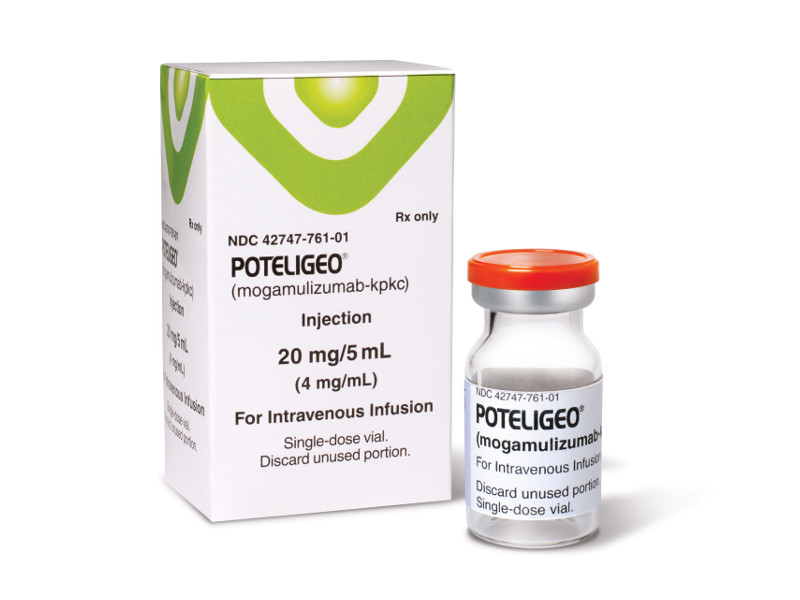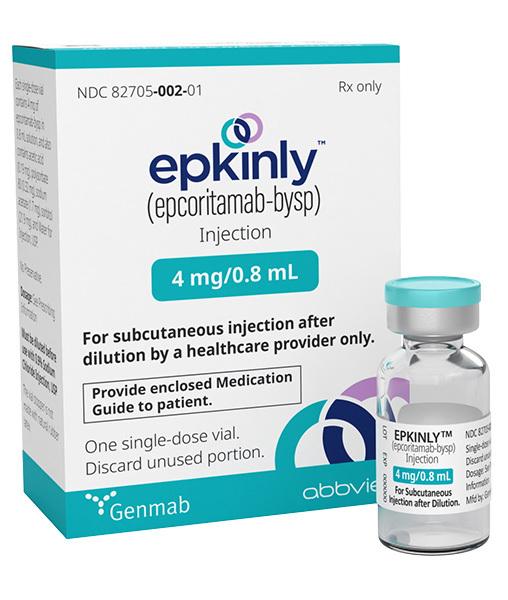Poteligeo (mogamulizumab) vs Epkinly (epcoritamab-bysp)
Poteligeo (mogamulizumab) vs Epkinly (epcoritamab-bysp)
Poteligeo (mogamulizumab) is a monoclonal antibody used for the treatment of certain types of cutaneous T-cell lymphoma (CTCL), specifically for patients who have received at least one prior systemic therapy. It targets the C-C chemokine receptor type 4 (CCR4) on the surface of cancer cells. In contrast, Epkinly (epcoritamab-bysp) is an investigational bispecific antibody designed to target CD20 on B-cells and CD3 on T-cells, potentially used for treating B-cell non-Hodgkin lymphoma; however, as of the knowledge cutoff in 2023, Epkinly is not yet approved by regulatory agencies. Patients should consult with their healthcare provider to determine the most appropriate treatment based on their specific type of lymphoma, previous treatments, and overall health status.
Difference between Poteligeo and Epkinly
| Metric | Poteligeo (mogamulizumab) | Epkinly (epcoritamab-bysp) |
|---|---|---|
| Generic name | mogamulizumab-kpkc | epcoritamab-bysp |
| Indications | Relapsed or refractory mycosis fungoides or Sézary syndrome | Currently under investigation for B-cell non-Hodgkin lymphoma |
| Mechanism of action | CCR4-directed monoclonal antibody | Bispecific antibody targeting CD3 on T-cells and CD20 on B-cells |
| Brand names | Poteligeo | Epkinly |
| Administrative route | IV infusion | Subcutaneous injection |
| Side effects | Rash, infusion reactions, fatigue, diarrhea, musculoskeletal pain | Currently under investigation; side effects are not fully characterized |
| Contraindications | Hypersensitivity to mogamulizumab or any component of the formulation | Not fully established; likely hypersensitivity to epcoritamab or components of the formulation |
| Drug class | Monoclonal antibody | Bispecific monoclonal antibody |
| Manufacturer | Kyowa Kirin | Genmab and AbbVie |
Efficacy
Efficacy of Poteligeo (Mogamulizumab) in Treating Lymphoma
Poteligeo (mogamulizumab-kpkc) is an immunotherapy drug specifically approved by the U.S. Food and Drug Administration (FDA) for the treatment of adult patients with relapsed or refractory mycosis fungoides (MF) or Sézary syndrome (SS), which are types of cutaneous T-cell lymphoma (CTCL). The efficacy of mogamulizumab was evaluated in a pivotal clinical trial known as the MAVORIC study, which was a phase 3 clinical trial comparing mogamulizumab to vorinostat in patients with relapsed or refractory MF and SS. The results demonstrated that mogamulizumab significantly improved progression-free survival (PFS) compared to vorinostat, with a median PFS of 7.6 months for mogamulizumab-treated patients versus 3.1 months for those receiving vorinostat.
The overall response rate (ORR) for mogamulizumab was also higher compared to vorinostat. In the trial, the ORR for mogamulizumab was 28% versus 4.8% for vorinostat. Additionally, the duration of response (DOR) was longer in the mogamulizumab group, with some patients maintaining a response for over three years. These results support the use of mogamulizumab as an effective treatment option for patients with MF and SS who have previously received systemic therapy.
Efficacy of Epkinly (Epcoritamab-bysp) in Treating Lymphoma
As of the knowledge cutoff date, Epkinly (epcoritamab-bysp) is an investigational bispecific antibody targeting CD3 on T-cells and CD20 on B-cells. It is designed to engage the body's immune system to fight against malignant B-cells. While epcoritamab has shown promise in early clinical trials, it is important to note that as of the knowledge cutoff date, epcoritamab has not yet been approved by the FDA or any other regulatory agencies for the treatment of lymphoma or any other condition.
In the available clinical trial data, epcoritamab has demonstrated efficacy in patients with relapsed or refractory non-Hodgkin lymphoma (NHL), including those with diffuse large B-cell lymphoma (DLBCL). Early phase clinical trials have reported encouraging response rates, with a significant proportion of patients achieving partial or complete responses. The ongoing trials are aimed at further evaluating the efficacy and safety profile of epcoritamab in a larger cohort of patients. As such, the final assessment of epcoritamab's efficacy for the treatment of lymphoma will depend on the outcomes of these clinical trials and subsequent regulatory review.
Regulatory Agency Approvals
Poteligeo
-
European Medical Agency (EMA), European Union

-
Food and Drug Administration (FDA), USA

-
Therapeutic Goods Administration (TGA), Australia

Epkinly
-
Food and Drug Administration (FDA), USA

Access Poteligeo or Epkinly today
If Poteligeo or Epkinly are not approved or available in your country (e.g. due to supply issues), you can access them via Everyone.org.
How it works

Make an enquiry
Choose the medicine you want to buy, answer a couple of questions, and upload your prescription to speed things up. We’ll get back to you within 24 hours.


Make an enquiry
Choose the medicine you want to buy, answer a couple of questions, and upload your prescription to speed things up. We’ll get back to you within 24 hours.


Breeze through the paperwork
We'll guide you through the required documents for importing unapproved medicine, ensuring you have all the necessary information.


Get a personalized quote
We’ll prepare a quote for you, including medicine costs and any shipping, administrative, or import fees that may apply.


Receive your medicine
Accept the quote and we’ll handle the rest - sourcing and safely delivering your medicine.

Some text on this page has been automatically generated. Speak to your physician before you start a new treatment or medication.
Let's talk
If you have any questions, call us or send us a message through WhatsApp or email:
Contact us




